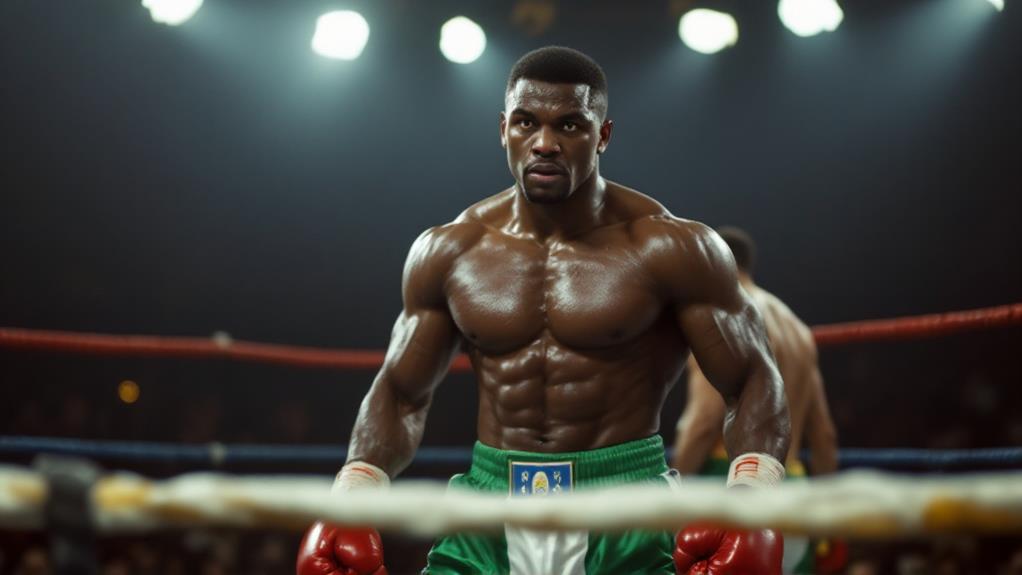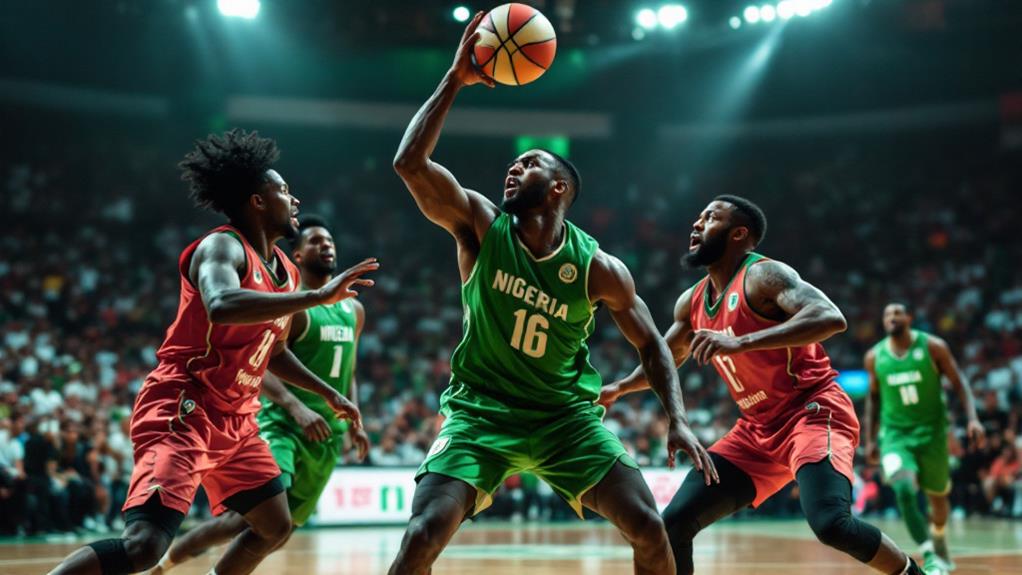Francis Obikwelu: From Nigeria to the World's Fastest Tracks
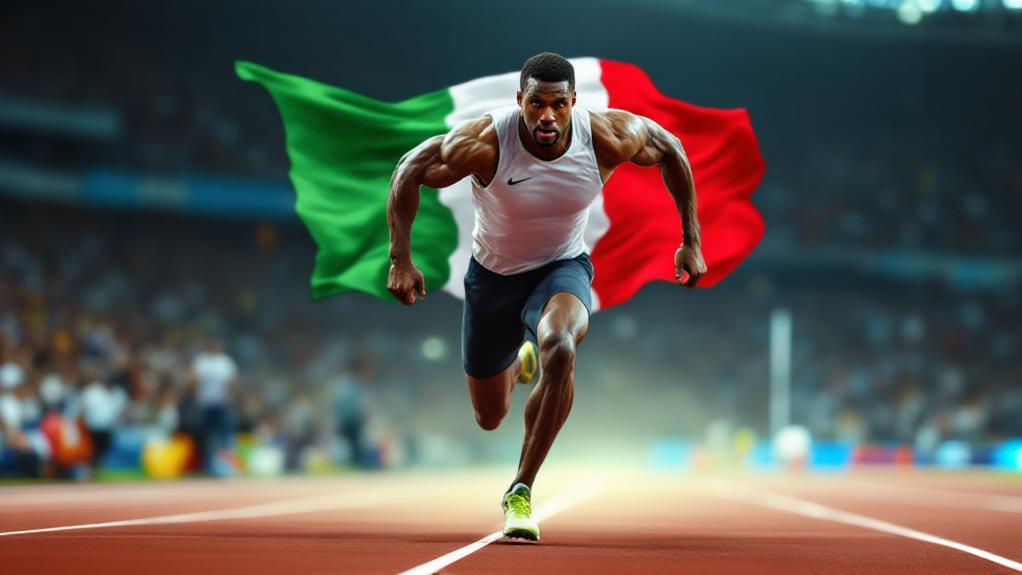
Francis Obikwelu's path from Nigeria to global sprinting stardom is a tale of resilience and triumph. You'll uncover how he overcame rejection in Portugal and a career-threatening knee injury to become one of Europe's top sprinters. Obikwelu's Olympic silver medal in Athens and his historic double victory at the European Championships showcase his exceptional speed and determination. He's also made a mark off the track, founding a charitable organization to help underprivileged kids in Portugal. From his early days playing football in Onitsha to his unexpected success in indoor sprinting, Obikwelu's story is filled with inspiring moments that demonstrate the power of perseverance.
Early Life in Nigeria
In the late 1970s, Francis Obikwelu's expedition began in Onitsha, Nigeria. Born in 1978, you'd find him growing up in a country brimming with potential athletic talent. As a young boy, Obikwelu likely spent his days like many Nigerian children, playing football in the streets and dreaming of future success.
Little did he know that his path would take an unexpected turn. At 14, a crucial moment arrived when a football coach recognized something special in Obikwelu. It wasn't his skill with the ball, but rather his raw speed and natural athleticism that caught the coach's eye. This observation led to a recommendation that would change Obikwelu's life forever: to pursue athletics instead of football.
Obikwelu took this advice to heart, throwing himself into track and field with the same passion he'd once reserved for football. His dedication paid off quickly. By 1994, at just 16 years old, he was representing Nigeria in the African Junior Championships. This early success hinted at the extraordinary career that lay ahead for the young athlete from Onitsha.
Discovering Athletics at Fourteen
Francis Obikwelu's life took an unexpected turn at fourteen. Born in Onitsha, Nigeria, he'd never considered athletics as a career path until a football coach's recommendation changed everything. This pivotal moment set him on a course that would lead him to become one of the world's fastest sprinters.
At his coach's urging, Obikwelu decided to try out athletics. His natural talent quickly became apparent, and he dove headfirst into training. Within a short time, his hard work paid off. At just 16 years old, Obikwelu represented Nigeria in the 1994 African Junior Championships, showcasing his potential on an international stage.
This early success in the world junior circuit was just the beginning. Obikwelu's consistent performances as a junior athlete hinted at the greatness to come. His ability to compete at such a high level at a young age foreshadowed his future achievements in senior competitions.
The decision to pursue athletics at fourteen would prove life-changing for Obikwelu. It set him on a path that would eventually lead him to Portugal, European championships, and Olympic glory, forever altering the direction of his life and career.
Move to Portugal

Lisbon's lively streets became Obikwelu's new home at just 16 years old. The young Francis Obikwelu made the bold move to Portugal following a football coach's recommendation, leaving his native Nigeria behind. This decision would shape his future in ways he couldn't have imagined.
You might think the transition was smooth, but Obikwelu faced initial rejection in his new country. Undeterred, he persevered until he found a place with the Belenenses athletic club. This resilience would serve him well throughout his expedition.
Obikwelu's trek took an unexpected turn when he represented Nigeria at the 2000 Sydney Olympics. A devastating knee injury threatened to end his running career, with doctors advising he'd never run again. But Obikwelu wasn't one to give up easily.
Through sheer determination and rigorous training, he defied medical expectations. His comeback culminated in a historic achievement at the 2004 Athens Olympics, where he clinched the 100m silver medal. This wasn't just a personal triumph; it marked Portugal's first Olympic medal in sprinting. Obikwelu's trek from Nigeria to Portugal had led him to the world's fastest tracks, setting new national records along the way.
Olympic Breakthrough in Athens
How does one define a breakthrough moment in sports? For Francis Obikwelu, it came at the 2004 Athens Olympics. With a blistering time of 9.86 seconds in the 100m final, he clinched the silver medal, etching his name in the record books.
You can't underestimate the significance of this achievement. It wasn't just Obikwelu's personal triumph; it was a historic moment for Portugal. He secured the country's first-ever Olympic medal in men's sprinting, setting a new national record in the process. But the impact of his performance reached beyond Portuguese borders.
Obikwelu's silver also ended a 15-year medal drought for Nigerian male athletes in international sprint events. It was a declaration of his resilience, having overcome a major knee injury earlier in his career. This Olympic success came on the heels of his double victory at the 2006 European Championships, where he'd claimed both the 100m and 200m titles.
For Obikwelu, the Athens Olympics weren't just another competition. They were the culmination of years of hard work, a defining moment that solidified his place among the world's elite sprinters.
European Championships Double Victory
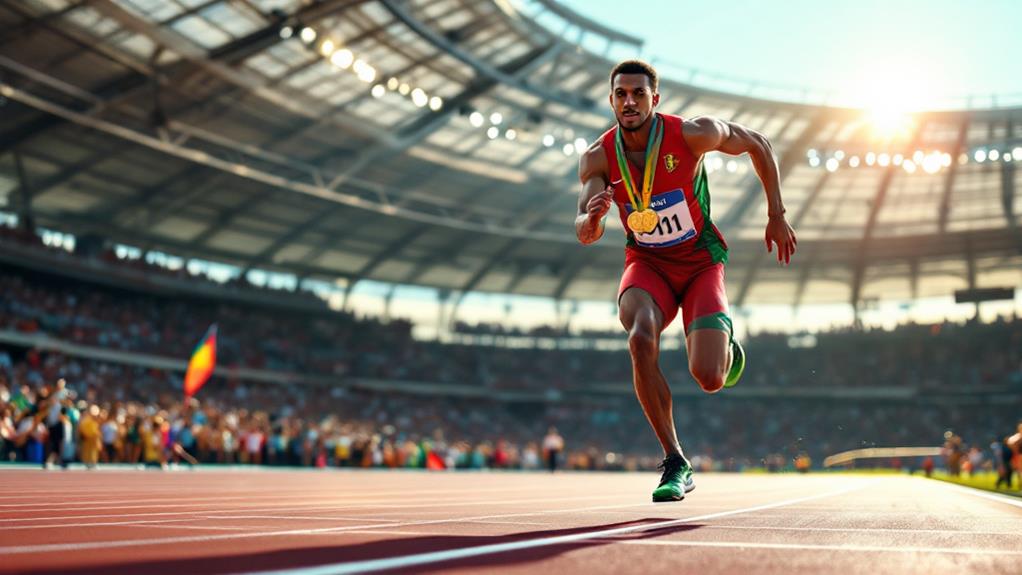
While Athens 2004 marked a pinnacle in Obikwelu's career, his dominance on the European stage was about to reach new heights. In 2006, Francis Obikwelu etched his name in the annals of European athletics history with a exceptional double victory at the European Championships.
You'd be hard-pressed to find a more dominant sprinting performance in European competition. Obikwelu blazed through the 100m in 9.97 seconds, clinching his second European title in the event after his 2002 victory. But he wasn't done yet. He followed up with an explosive 19.84-second run in the 200m, setting a new Portuguese national record that would stand for over a decade.
This incredible feat made Obikwelu the first male athlete to achieve the 100m and 200m double at the European Championships. His sprinting dominance was on full display, leaving competitors in his wake and cementing his status as Europe's premier sprinter of the 2000s. Obikwelu's double victory wasn't just about personal glory; it was a statement of his enduring excellence and a crowning achievement in his illustrious career.
Overcoming Career-Threatening Injury
In the face of adversity, Francis Obikwelu's odyssey took a dramatic turn in 2000 when he suffered a devastating knee injury. Doctors delivered a crushing blow, declaring he'd never run again. But Obikwelu wasn't ready to hang up his spikes.
The determined athlete underwent surgery in Canada, facing a grueling recovery process. You can imagine the challenges he encountered:
- Endless hours of physical therapy
- Sleepless nights filled with doubt and pain
- The mental struggle to stay motivated
- Pushing his body to its limits daily
Despite the bleak prognosis, Obikwelu remained fixated on his goal of returning to elite competition. His unwavering dedication and passion for the sport fueled his comeback. Through sheer willpower and intensive training, he defied the odds.
Obikwelu's perseverance paid off in spectacular fashion. Not only did he return to the track, but he also clinched a silver medal in the 100m at the 2004 Athens Olympics. His path didn't end there. He went on to win multiple European titles and set the European 100m record of 9.86 seconds, solidifying his place among the world's fastest sprinters.
Retirement Plans and Comeback
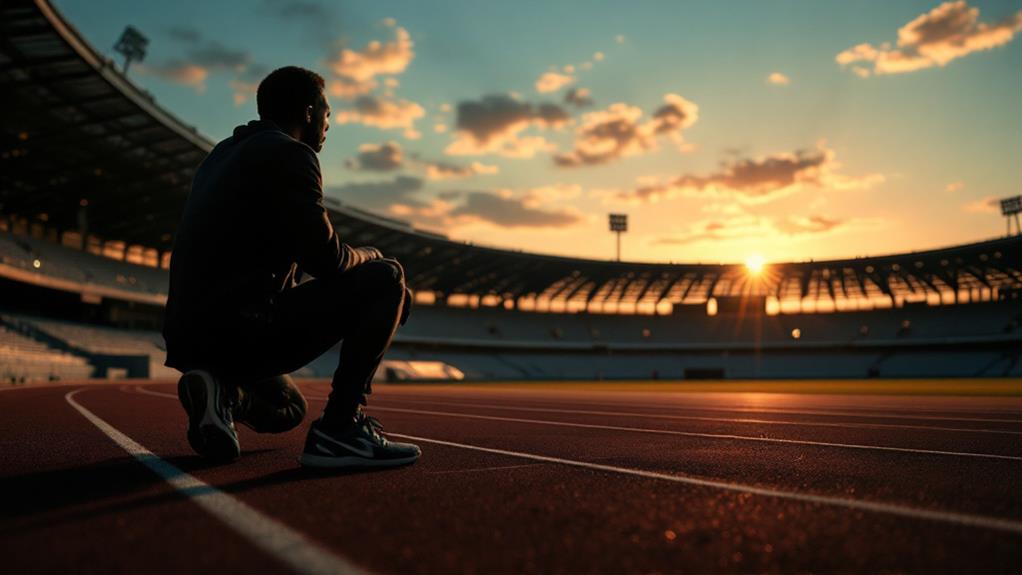
After an extraordinary career, Francis Obikwelu contemplated retirement following the 2009 season. However, he was persuaded to continue competing, setting his sights on a third European 100m title in 2010. Despite his determination, Obikwelu's quest fell short as he finished fourth in the final.
Undeterred by this setback, Obikwelu decided to postpone his retirement plans and adjust his approach. He opted for a low-key indoor season leading up to the European Championships, a strategy that would prove highly effective. At the European Indoor Championships, you'd have witnessed Obikwelu's phenomenal comeback as he cruised to victory in the 60m final, setting a new national record of 6.53 seconds.
What's particularly impressive about Obikwelu's triumph is that his large frame seemed ill-suited for indoor running. Yet, he defied expectations through a relaxed approach and training alongside Evora. This unexpected success showcased Obikwelu's adaptability and resilience, proving that his decision to delay retirement was well-founded. His victory at the European Indoor Championships not only added another accolade to his impressive career but also demonstrated his enduring competitiveness at the highest level.
European Indoor 60m Championship
Francis Obikwelu's path to the European Indoor 60m Championship title was nothing short of extraordinary. You'd think his large frame would hinder him indoors, but he proved everyone wrong. Cruising through the heats and semi-finals with a time of 6.61 seconds, Obikwelu was ready for the final showdown.
In the final, he exploded out of the blocks, leaving his competitors in awe. You could almost feel the tension as he edged out Dwain Chambers by a mere 0.01 seconds. Obikwelu's relaxed approach paid off, as he clinched the gold medal with a new national record of 6.53 seconds.
His success at the European Indoor Championships can be attributed to:
- Intense training with Evora
- A calm and composed mindset
- Refusal to push himself too hard
- Adapting his running style to indoor tracks
You'd never guess that Obikwelu once struggled indoors. His victory in the 60m event signaled a promising outdoor campaign ahead. While his future plans remained unclear, one thing was certain: Francis Obikwelu had solidified his place among the world's elite sprinters, both indoors and out.
Charitable Foundation in Portugal
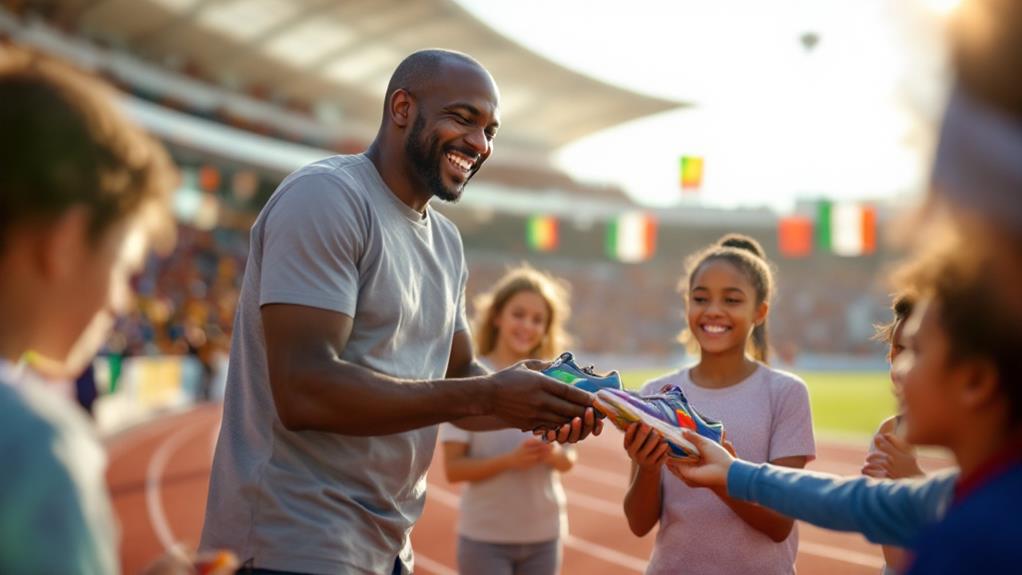
While his athletic achievements are impressive, Obikwelu's impact extends far beyond the track. After competing in World Championships and Olympic Games, Francis Obikwelu established a charitable foundation in Portugal that's making a significant difference in the lives of young athletes.
You'll find that Obikwelu's foundation focuses on teaching athletics to kids, particularly those from underprivileged backgrounds. It's his way of giving back to the community and promoting the sport he loves. Through this initiative, you can see how Obikwelu is sharing his passion for athletics with the next generation, providing them with opportunities they might not otherwise have.
The foundation's work highlights Obikwelu's commitment to using his platform for positive change. By offering underprivileged youth in Portugal the chance to learn and develop their athletic skills, he's not only nurturing potential future champions but also helping these kids build confidence and discipline.
Obikwelu's charitable work demonstrates that his legacy isn't limited to his performances on the world's fastest tracks. He's creating a lasting impact by investing in the future of athletics and the lives of young people in his adopted home.
Legacy and Future Aspirations
Obikwelu's impact on athletics extends far beyond his charitable work. As Nigeria's fastest male athlete in the 200m, he's left an everlasting mark on the sport. His resilience in overcoming a career-threatening knee injury has cemented his legacy as a true fighting warrior. You'll be inspired by his determination to defy doctors' predictions and continue running at the highest level.
At 32, Obikwelu's not slowing down. He's eyeing a potential fifth Olympic Games appearance, treating his athletics career as a source of enjoyment rather than a battle. This silver medalist's legacy is characterized by:
- Blazing speed on the track
- Unwavering determination in the face of adversity
- A commitment to giving back to the community
- A passion for the sport that transcends age
Obikwelu's future aspirations are a testament to his enduring love for athletics. After considering retirement in 2009, he went on to win the European Indoor 60m title in 2010, setting a new national record. His continued success and positive outlook serve as an inspiration to aspiring athletes worldwide, proving that with dedication and resilience, you can overcome any obstacle and achieve greatness.
